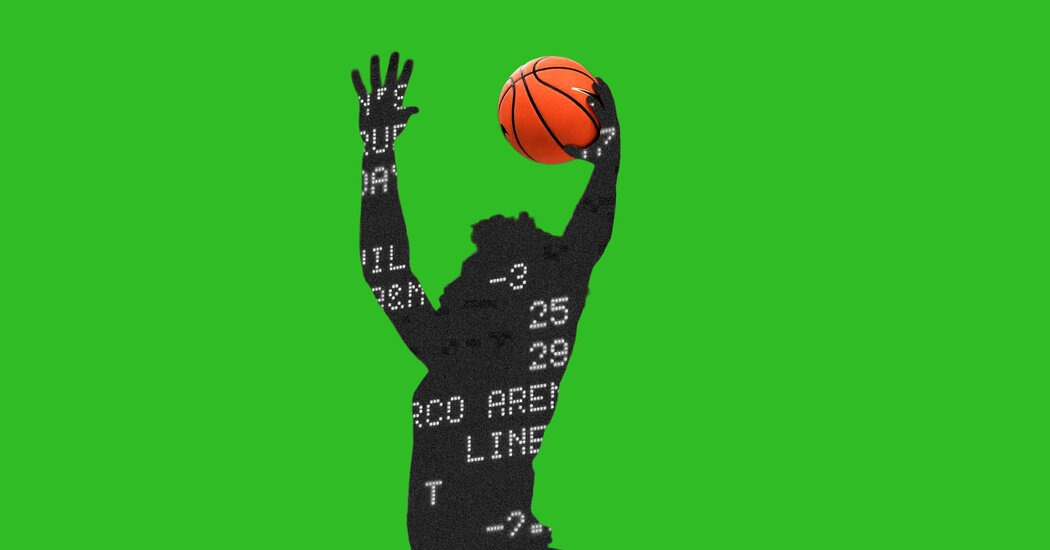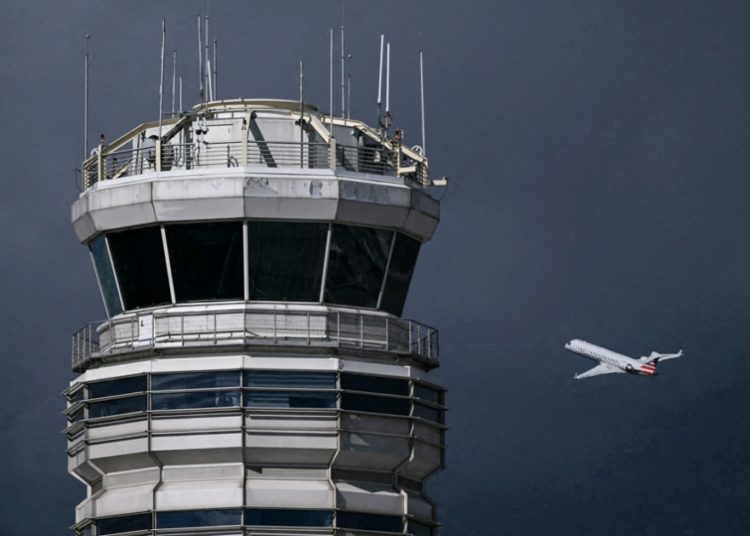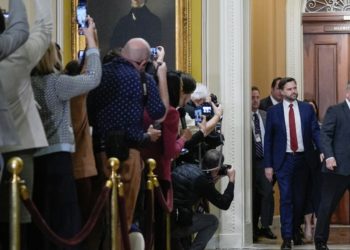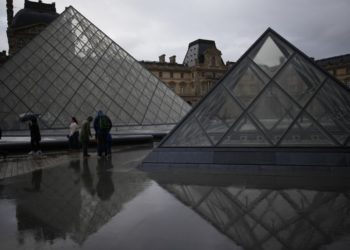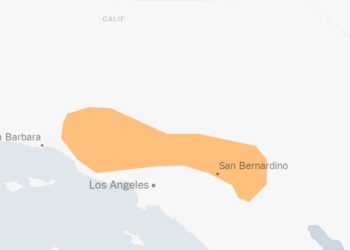There’s no denying it anymore: The arrests last week of an N.B.A. player and a head coach after allegations of insider sports betting and poker-game rigging aren’t isolated scandals. They are what we should expect in an industry in which the oddsmakers are calling the shots.
Gambling doesn’t just sponsor sports games. It shapes them, deciding which matchups are worth watching and how players are covered. Gambling doesn’t just buy ads. It owns sports networks, producing shows that prod fans to bet ever more.
This didn’t happen overnight. Gambling has long been a staple of sports bars, college dorms and office pools, but professional sports still treated it as an existential threat. That changed roughly a decade ago, when the leagues — scrambling for a way to recapture some of the viewers they had lost — convinced themselves to embrace their longtime enemy.
Today, athletes are getting sucked in, their reputations and even their mental health increasingly damaged by the markets that profit off them. A 2025 survey found that 21 percent of sports bettors say they’ve verbally abused an athlete, in person or online. “We call ourselves zoo animals,” said Boston Red Sox pitcher Lucas Giolito, who says he has been threatened and told to kill himself.
Allegations of athletes betting on games in their own leagues are multiplying. Six in 10 Americans now express skepticism about the integrity of sport, wondering whether players, referees and coaches are throwing games.
All the while, gambling addiction is quietly growing, leaving a trail of financial ruin, debt and shame. Thirty-seven percent of American adults — and 60 percent of avid fans — say they have placed a bet on sports. Nearly half of men ages 18 to 49 report having an online sports betting account.
We see gambling everywhere now — in our soaring stock market, the booms and busts of Bitcoin, the rise of techno-oligarchs like Elon Musk. The democratic process itself can now effectively be wagered on.
But for generations, sports was one of the few places where Americans could still gather around something bigger than ourselves. Now, that shared space is controlled by the house. We tally payouts, refresh apps and track odds until a game becomes little more than a series of outcomes to be predicted and monetized. Fans don’t even care about the score. Once their bets are settled, the game itself increasingly becomes background noise. In this unforgiving calculus, fandom becomes an afterthought, not just to casual viewers, but to the leagues themselves.
When I talk to people who work in sports, they’ll publicly assert that legal gambling helps them catch the bad actors. Spot irregular activity. Monitor the system. But off the record, they quietly admit the truth: Gambling touches everything. The betting apps are in charge now, and everyone knows it. The leagues are hostage to the forces they unleashed.
One baseball executive told me that the industry knows the risks, but it’s in deep.
The leagues didn’t just open the door to gambling. They helped build the house.
For most of the 20th century, gambling was the great moral line in American sports. After eight Chicago White Sox players were accused of throwing the 1919 World Series, all major sports viewed betting as a capital sin. Rules were posted in locker rooms with warnings about betting within the sport. In 1989, Pete Rose, baseball’s hits leader, was ejected from the sport for life for betting that his teams would win.
By the 1960s, fantasy sports leagues were spreading across the country, powered by small bets and the thrill of proving you knew the game best. The activity remained niche until the 1990s, when the football video game Madden NFL turned fantasy’s nerdy numbers into immersive, almost lifelike game play. The leagues saw these games as a potent — and highly profitable — form of fan recruitment.
In 2004, the N.F.L. agreed to give Madden’s producer, the video game company Electronic Arts, the ability to embed logos, uniforms and rosters into video games for a reported $300 million, marking the first of numerous deals. Now fans could instantly assemble and create rosters of their favorite N.F.L. players. If the leagues and the video game makers didn’t know the game was popular with kids, they should have: The game has long been rated E for everyone by the Entertainment Software Rating Board.
I was one of them. My friends and I would huddle around controllers in someone’s basement, arguing over trades and simulated matchups. We competed for some money within our group, but mostly bragging rights and the feeling we understood sports better than our friends.
The same year the N.F.L. struck its Madden deal, an Asian videogame boosted revenue by selling tickets within the game for random prizes. By 2010, the feature had drifted to Madden. It was intoxicating. Pull a star, you got the rush. Pull a dud, you felt the sting. It wasn’t called gambling, but it sure felt like it.
By 2021, scientists had demonstrated that such “loot boxes” are so strongly associated with problem gambling we might as well have been handed slot machines. Parts of Europe have banned loot boxes, but the video game makers kept on cashing in on them in America. Take-Two, another video game company, earned some 80 percent of its 2023 revenue from microtransactions including loot boxes in its NBA 2K game and others, which is sold worldwide but mostly played here. The leagues’ take ballooned: By May 2020, the N.F.L. and its players locked in a $1.5 billion five-year extension with Electronic Arts for Madden alone.
What came next now feels almost inevitable.
FanDuel and DraftKings — today’s titans of the sports betting world — started in 2009 and 2012. Unlike traditional fantasy leagues, where you perhaps bet once a season, these platforms let you assemble a new team, and bet on it, every single night. The companies argued in court filings they were pitching a “game of skill,” a legal distinction that let them avoid the rules that govern casinos and sports books.
By the time I started college in 2013, FanDuel and DraftKings commercials were all over the place — on N.F.L. games, on sports websites, before YouTube clips, on podcasts. When their apps launched a few years later, they were slick, fast, easy to use. For guys like me — sports-obsessed kids who’d grown up on a steady diet of video games — signing up didn’t feel like betting. It felt like graduation.
A switch had flipped. League executives started to panic as they watched younger fans dump their cable subscriptions amid a crush of other online entertainment options. Ratings were falling fast — roughly 14 percent in the 2012-13 regular season alone for the NBA. The 2012 World Series was one of the least watched in TV history.
But data also showed that younger people were spending hours on fantasy and betting apps. FanDuel and DraftKings executives were lobbying the leagues hard, arguing that gambling was the way to keep fans interested. And that’s when gambling went from scourge to savior.
In 2014, the N.B.A. signed a partnership with FanDuel, giving the company — like the video game makers before it — access to the N.B.A. logo and all the legitimacy that came with it. The N.B.A.’s commissioner, Adam Silver, wrote an essay for The New York Times arguing that legalized betting would protect the integrity of the game, protect minors and help leagues spot corruption before it spread. “I believe sports betting should be brought out of the underground and into the sunlight,” he said.
Four years later, when the Supreme Court struck down the federal gambling ban in Murphy vs. National Collegiate Athletic Association, the leagues called it progress.
What started for fans as once a season became every day, and is now a constant stream of action. DraftKings and FanDuel allow gamblers to bet on virtually any moment in nearly any game happening almost anywhere.
The friends I used to play video games with now fire off parlays before lunch, during the afternoon games and when they’re struggling to go to bed. They’ll gamble on almost everything: Sunday football, Korean baseball, Lithuanian table tennis.
There are signs players are getting caught up as well. Among the allegations in the federal gambling indictments last week was that a former player had leaked an update of LeBron James’s injury status to bettors on an N.B.A. game. A Miami Heat guard, Terry Rozier, was accused of intentionally removing himself from a game so a co-conspirator could cash in on his unexpected underperformance. Portland Trail Blazers head coach Chauncey Billups was not charged in the indictment of Rozier, but he matches the description of a co-conspirator who allegedly informed gamblers his team was planning to tank a game so bettors could win big.
Part of what allows this to persist is the hammerlock gambling companies now have on the sports ecosystem.
Last October, Bally Sports — which airs M.L.B., N.B.A. and N.H.L. games for 30 teams in 33 states — announced that it was rebranding itself FanDuel Sports Network. Now, games are broadcast with an icon that, when clicked, displays live betting odds. A segment on why Patriots quarterback Drake Maye has drastically improved his performance might integrate his rising odds for M.V.P.
Both DraftKings and FanDuel have built sprawling media operations, hiring their own personalities, starting streaming channels, and producing gambling-centric content for YouTube, podcasts and social platforms. While FanDuel has invested in traditional broadcasting, DraftKings has focused on digital distribution, expanding its slate of influencer-driven shows aimed at young audiences.
The depth of entanglement isn’t just metaphorical. Leagues now have direct financial stakes in the infrastructure of sports betting. The N.F.L., M.L.B. and the N.B.A. have equity in companies like Sportsradar and Genius Sports, which supply the live data feeds that power most American sports books. At the same time, starting in 2021, the N.F.L. has committed $12 million over six years to the National Council on Problem Gambling, directly funding initiatives like the National Problem Gambling Helpline, where you can call when the thing the leagues profit from becomes a personal crisis.
They’re not alone: FanDuel also gave $150,000 to the National Council on Problem Gambling and DraftKings has given $2 million to state-level problem gambling councils since 2022. The very companies contributing to the addiction are helping to fund the safety net meant to address it.
The legacy sports journalism world, which used to build the folklore of the games and ensure its integrity, is increasingly focused on pushing the next bet. ESPN has a sports book calculating odds and its app displays odds on demand. Its “SportsCenter” broadcast regularly guides viewers on the odds for the evening’s matchups. (The Athletic, which is owned by The New York Times Company, has a partnership with BetMGM, an online sports betting and gambling company.)
Today, the gambling companies wield far more power over sports than the leagues or team owners ever did. News media outlets have criticized commissioners, players and executives for decades. But I can’t recall a single major sports broadcast program or publication willing to take gambling companies on directly. My friends in sports journalism tell me this is the one topic they can’t speak up about — not without risking their careers.
In dollars, the leagues’ gamble worked. The ratings slide stopped, and the N.F.L., N.B.A. and M.L.B. all landed huge media rights deals. Executives publicly credit gambling for increasing engagement, but privately, everyone knows the truth: The system is in trouble. I’ve spoken to league officials who’ve acknowledged unease not just about the scale of gambling itself, but about how far the business of sports has tilted toward gamblers.
It’s not hard to imagine a future where everything — politics, sports and entertainment — blurs into speculation. DraftKings and FanDuel are now under threat of being usurped by up-and-coming platforms like Kalshi and Polymarket, which — under the banner of predictions markets — found a way to take “bets” on sports and many other events even in states where sports betting is banned. Both Kalshi and Polymarket also boast strong White House connections: Donald Trump Jr. is an advisor to both companies, and the venture fund in which he is a partner has invested in Polymarket, which is now looking to lock in deals that would value it at $12 billion to $15 billion.
Walking through Manhattan the other day, I passed a digital billboard from Kalshi showing live odds for the New York City mayor’s race, updating in real time and displaying live trades. The culture of betting isn’t limited to sports anymore. It’s everywhere.
Some argue sports gambling should be banned. While that would be the cleanest fix, I’m not convinced it’s politically feasible or even the right solution. Betting adds stakes, and for many, it’s fun. But what is clear is that our country has failed to install even the most basic protections for fans, players and kids.
Even Silver, the N.B.A. commissioner who wrote that 2014 essay, is starting to sound uneasy. Two days before the F.B.I. arrests, he noted the league had asked its gambling partners to pull back bets that seem particularly vulnerable to manipulation and added that more federal regulation is needed. The day after the arrests, members of Congress requested a bipartisan briefing with Silver, noting the latest charges “raise serious concerns about sports betting and the integrity of sport in the N.B.A.”
Other countries found ways to limit the damage. Belgium and the Netherlands clamped down on loot boxes. Australia restricts gambling ads before, during and after games; Italy banned them in 2018. Britain restricted gambling ads and some sponsorships, and since then, more people there have sought help for their gambling problems.
The United States should follow suit.
We can also ban bets on individual player performance. Nearly every major gambling scandal, including the one last week, has centered on such bets. That was the kind of bet that allegedly prompted Rozier to pull himself out of a game early. Last year, Jontay Porter was banished from the N.B.A. for the same thing.
Traditional casinos are legally bound by guardrails meant to limit addiction; the online gambling ecosystem is largely not. That needs to change.
We can force gambling apps to eliminate their V.I.P. programs, which critics say reward their most addicted users. These companies should require time limits and cooling-off periods. Make riskier bets require more than a tap. We need to create a system to identify, and swiftly respond, to the newcomers and their legal sleights-of-hand — before they rewrite the rules again.
These are stopgaps, not cures. The rot runs so deep that even the most well-intentioned reforms can only begin to scratch the surface.
For years, the leagues, networks and sports books have pretended that gambling is just another way to “engage fans.” Officials pointed to last week’s arrests as proof that the system is catching bad actors. But the rising frequency of these scandals, and the public’s fading trust, points to an industry rotting from the inside — one that rewards corruption, punishes transparency and treats addiction as a business model. The same institutions that claim to protect the integrity of the game have built an economy dependent on its erosion. And the deeper the rot goes, the more it misleads fans that gambling isn’t just part of sports, but part of being American.
The leagues will say the soul of the game is intact. That nothing’s changed. But anyone paying attention can see what’s happening. If we lose sports, the last place we were allowed to scream, believe, lose and still return, we don’t just lose a game. We lose one of the last shared places where fairness still felt possible — the faith that effort, honesty and hope could still decide the outcome.
Joon Lee is the founder of Morning Announcements, which produces his YouTube channel on sports and culture.
Source photographs by Brandon Dill/Associated Press and John Gurzinski for The New York Times.
The Times is committed to publishing a diversity of letters to the editor. We’d like to hear what you think about this or any of our articles. Here are some tips. And here’s our email: [email protected].
Follow the New York Times Opinion section on Facebook, Instagram, TikTok, Bluesky, WhatsApp and Threads.
The post Sports Bet on Gambling. Everyone Lost. appeared first on New York Times.
